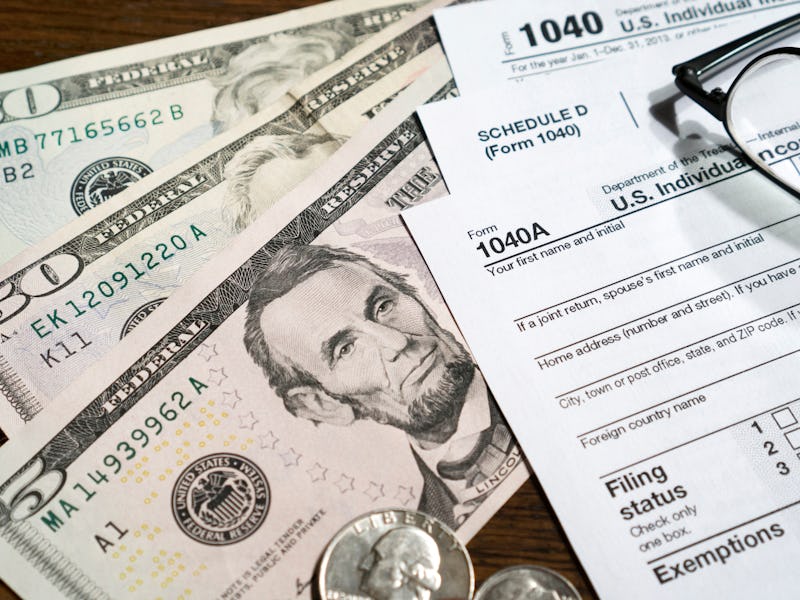How to Get Into the Mood to File Your Taxes
April 18 is going to be here quicker than you think -- get your brain ready to file painlessly and effectively.

Aw, man. Taxes. Again. Everyone has a few extra days to get everything in line this year: Because Emancipation Day falls on April 15 in 2016, we all have until April 18 to file our federal income taxes and prepare ourselves mentally to get through the slog. Great, right? More time to procrastinate! Mental readiness is the ally to the weary — taxes aren’t super complicated, but they are really boring.
The next couple months are going to go by faster than you think. Stop dawdling; set the mood with these steps and you’ll file before you’ve begun to think of it as a chore.
Bummm paa daaaa
Choose the Right Setting
If you’re doing the paperwork yourself, you might as well do it in an environment that’s going to make you happiest. Luckily, the academics of the world have done a fair amount of research on what space is ideal. Relatively clean and open workspaces help concentration levels, and rounded, curvy furniture have been proved to make people feel happier than stuff with straight edges and sharp angles. A University of Exeter study found that people work best in well-decorated rooms, but they work even better in a room that they decorated themselves. Houseplants have been scientifically proved to improve levels of concentration, as has the color red — but if you’re trying to be a little creative with your tax write-offs, it’s better to work surrounded by the color blue. Ideally, your work space looks a bit like this:
Clean but not too clean.
Set the Right Temperature
The U.S. Occupational Safety and Health Administration recommends that the ideal temperature to work in is between 68 and 76 degrees. Other studies have found that the ideal temperature for maximum concentration levels is 72 degrees, but choosing the temp can be a tricky game: If you’re too cold, you’re more likely to make more errors and if you’re too hot you are more likely to have a harder time (and shy away from) making complex decisions. When in doubt: Choose a temperature a few degrees chillier than what you think may be the ideal.
Grab Some Incense or Candles
Yes, this is starting to get a bit seductive, but respect the power of scent: Fragrances can act as cheat code for setting the right mood. If the workload gets too stressful, grab some lavender. Studies have shown that the flowering plant has a slightly calming and soothing affect. Peppermint and rosemary each produce a scent that helps people complete tasks that require sustained concentration, and the fragrances of lemon and jasmine have shown to be helpful in awakening the mind for cognitive tasks.
Put on Some Music
Years of research has demonstrably proved that music helps stabilize mental, physical, and emotional rhythms: It’s the elixir your brain needs to get shit done. Working to music releases dopamine, keeping you happier, and it usually helps you work faster, to boot.
Baroque music is optimal; because it operates at 50 to 80 beats per minute, the alpha brain wave state is able to reach a level of deep concentration. The hottest artist to listen to during tax season: Johann Sebastian Bach. Studies have shown that the composer’s music is particularly keen for relieving stress.
Feel Free to Take Some Breaks
Psychology says there are basically to ways humans get distracted: From tasks that are so hard they create mental fatigue and activities that are so mindless that they’re too boring. Taxes basically tap into both of these distractions. To hold true to the course, the best thing you could probably do is allow yourself to take a few breaks.
Pizza break.
If you’re really on a roll, sure, keep going. But if you find yourself lagging, take a 10 — you’re likely to feel more productive and creative when you come back. The ideal work schedule? Work for 52 consecutive minutes, then take a 17-minute break.
Talk Yourself Through It
Motivational self-talk is good for you — hyping yourself up improves your attention span, confidence, and control. Technical self-talk, when you say out loud specifically what you’re trying to do, is an effective way of improving the skills you’re simultaneously trying to utilize. So repeat after me: You can reinvest your dividends, you can reinvest your dividends, you can reinvest your dividends.